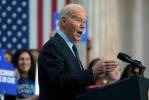Is Obama a leader or a rigid partisan?
President Obama’s third trip to Southern Nevada in six months will be brief. He’ll visit Boulder City’s Copper Mountain Solar One array Wednesday to promote an energy strategy that’s reminiscent of the campaign that swept him into the White House almost four years ago.
It’s about inclusiveness. It’s about change and leadership. It’s bipartisan. It’s “all of the above.”
He’ll appear in four states in two days to highlight everything from green energy to oil and assure voters that all options are on the table to power our economy.
The president has provided his critics with plenty of reasons to greet this plan with skepticism. After all, his administration has limited oil exploration, clamped down on coal, rejected the Keystone XL pipeline and heaped huge subsidies on alternative energy outfits that quickly went bust. The millions of green jobs he pledged to deliver — like so many of his 2008 campaign promises — never came to be.
So is the president intent on leading this time? Will he defy the Democratic Party’s base? Will he act in the best interests of the country or merely do what’s best for his re-election?
A weekend report from The Washington Post raises serious questions about the president’s ability to reach across the aisle, not to mention stick to his word.
The article, “Obama’s evolution: Behind the failed ‘grand bargain’ on the debt,” reveals how last summer’s negotiations to reduce future federal budget deficits and raise the nation’s debt ceiling collapsed and worsened the Capitol’s partisan divide. Contrary to the claims of the president and congressional Democrats, who blame GOP inflexibility and extremism for the breakdown, the Post report says House Speaker John Boehner and Majority Leader Eric Cantor were willing to cross their chamber’s conservative members for the right deal. Far from being obstinate, they conducted secret talks with the administration, where they gradually dropped several demands.
At a few points during those talks, according to the report, both sides thought an agreement was at hand. A combination of major tax and entitlement reforms, of new revenues and spending cuts, would leave both Republicans and Democrats equally outraged. Senate Majority Leader Harry Reid, D-Nev., was open to the deal.
It wasn’t to be. The Post reports that the president feared angering his base, and when a handful of Republican senators indicated they might support big tax increases that House Republicans wouldn’t, Mr. Obama “moved the goalposts” and backed out of the broad outlines Mr. Boehner thought they had settled in a “gentlemen’s agreement.”
Standard & Poor’s subsequently downgraded the U.S. debt, and Mr. Obama began his aggressive criticism of Republicans that continues to this day. The president says he can’t work with Republicans because they won’t work with him. But that doesn’t appear to be true.
Can he compromise to deliver on his promises? Is Mr. Obama really an “all of the above” kind of president, or just another rigid partisan? Perhaps he can elaborate Wednesday.


















